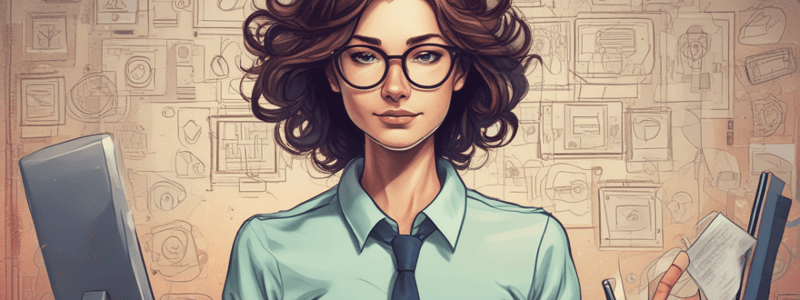Podcast
Questions and Answers
What is a main reason for our fatigue, according to Dale Carnegie?
What is a main reason for our fatigue, according to Dale Carnegie?
What was Nancy's response to her frustration initially?
What was Nancy's response to her frustration initially?
What did Nancy realize was the source of her unstable emotion?
What did Nancy realize was the source of her unstable emotion?
What happened to Nancy's brain when she felt frustrated?
What happened to Nancy's brain when she felt frustrated?
Signup and view all the answers
What happened to Nancy's irritation when she made some 'breathing room'?
What happened to Nancy's irritation when she made some 'breathing room'?
Signup and view all the answers
What happened to Nancy's brain when she felt overwhelmed?
What happened to Nancy's brain when she felt overwhelmed?
Signup and view all the answers
What did Nancy realize she needed to do to avoid sliding into her frustrated mind-set?
What did Nancy realize she needed to do to avoid sliding into her frustrated mind-set?
Signup and view all the answers
What were the three things Nancy felt grateful to her company for?
What were the three things Nancy felt grateful to her company for?
Signup and view all the answers
What did Nancy's exercise in gratitude ultimately give her?
What did Nancy's exercise in gratitude ultimately give her?
Signup and view all the answers
What is one of the sources of pride in being a human being, according to Helen Merell Lynd?
What is one of the sources of pride in being a human being, according to Helen Merell Lynd?
Signup and view all the answers
Nancy's frustration was triggered by her inability to recognize her boss's trust and respect.
Nancy's frustration was triggered by her inability to recognize her boss's trust and respect.
Signup and view all the answers
The frontal lobe is the part of the brain that is responsible for making impulsive decisions.
The frontal lobe is the part of the brain that is responsible for making impulsive decisions.
Signup and view all the answers
Nancy's initial response to her frustration was to change her perspective.
Nancy's initial response to her frustration was to change her perspective.
Signup and view all the answers
Nancy's exercise in gratitude only gave her temporary relief from her frustration.
Nancy's exercise in gratitude only gave her temporary relief from her frustration.
Signup and view all the answers
It is possible to feel grateful and frustrated at the same time.
It is possible to feel grateful and frustrated at the same time.
Signup and view all the answers
Study Notes
Frustration and Gratitude
- Frustration is often caused by worry, frustration, and resentment, rather than work itself.
- Feeling frustrated can lead to feelings of anxiety, tiredness, and being harried.
Understanding Frustration
- Frustration can make a person feel like a victim or self-righteous, leading to a downward spiral of emotions.
- When frustrated, a person's brain can go into "fight or flight" mode, shutting down the frontal lobes and impairing decision-making and impulse control.
The Power of Perspective
- Changing one's perspective can help transform frustration into gratitude.
- Focusing on what has been given rather than what has been taken away can shift a person's mindset.
- Practicing gratitude can help recenter oneself and provide poise in difficult situations.
The Role of Gratitude
- Gratitude cannot coexist with feelings of frustration and victimhood.
- Focusing on gratitude can help a person gain respect from others and themselves.
- Changing one's perspective to focus on gratitude can lead to long-term personal growth and development.
Key Insight
- Frustration often stems from a desire for the world to change to make us feel better, but true change comes from shifting our own perspective.
Frustration and Gratitude
- Frustration is often caused by worry, frustration, and resentment, rather than work itself.
- Feeling frustrated can lead to feelings of anxiety, tiredness, and being harried.
Understanding Frustration
- Frustration can make a person feel like a victim or self-righteous, leading to a downward spiral of emotions.
- When frustrated, a person's brain can go into "fight or flight" mode, shutting down the frontal lobes and impairing decision-making and impulse control.
The Power of Perspective
- Changing one's perspective can help transform frustration into gratitude.
- Focusing on what has been given rather than what has been taken away can shift a person's mindset.
- Practicing gratitude can help recenter oneself and provide poise in difficult situations.
The Role of Gratitude
- Gratitude cannot coexist with feelings of frustration and victimhood.
- Focusing on gratitude can help a person gain respect from others and themselves.
- Changing one's perspective to focus on gratitude can lead to long-term personal growth and development.
Key Insight
- Frustration often stems from a desire for the world to change to make us feel better, but true change comes from shifting our own perspective.
Studying That Suits You
Use AI to generate personalized quizzes and flashcards to suit your learning preferences.
Description
This quiz assesses your understanding of managing frustration and resentment in middle management positions. Learn how to cope with customer rudeness, impossible demands, and other workplace stressors.



